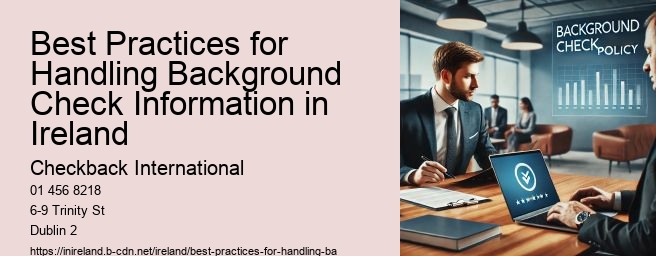

Background check consent forms must be submitted.
PSA Background Checks in Ireland
How Does GDPR Impact the Storage of Background Check Data?
What Happens if a Candidate Refuses to Undergo Pre-Employment Vetting?
1.Verification of self-employment periods
Companies receive clear cost breakdowns before starting, which helps with budget planning and prevents unexpected costs during recruitment.
These reports contain several key elements that show a detailed financial profile of individuals.
1.Scope: A complete provider should cover education, employment, criminal records, and personal references.
3.Organizations must follow both EU-wide data protection legislation and country-specific privacy requirements.
How to Address Background Check Findings in the Hiring Process

Background checks in Ireland operate under the Private Security Authority (PSA) regulation through the Private Security Services Act 2004. The process includes criminal record verification through An Garda Sìochána, employment history reviews, and personal reference checks. Standard processing takes 5-10 working days, with thorough screenings requiring up to 21 days. For security personnel, mandatory five-year background screenings maintain PSA standards. The verification system shows key information about candidate suitability.
The vetting agency performs a thorough review, which includes criminal records checks, employment history verification, and financial stability assessments.
Importance of Compliance in PSA Vetting


Processing time depends on quick submission of required documents and the individual's background complexity.
If a candidate disagrees with their background check results, they can file a formal dispute and provide supporting documents. The background screening company will review the contested information and make updates based on any new materials submitted.
Conclusion
Contractor VettingEmployers can review public social media profiles but must follow data protection laws and get clear permission from job candidates.
Cost Considerations for PSA Vetting
Pre-employment vetting in Ireland includes consumer credit checks to review candidates' financial history.
Employment Screening Services
For costs, basic candidate reports begin at €120. Additional fees apply based on how detailed and broad the background check needs to be.
Step-by-Step Application Process for ECRC
The components also cover date of birth verification, bankruptcy checks, and specific screenings for regulated sectors like financial services and aviation.

A background check in Ireland involves reviewing a person's criminal, financial, or personal records to assess their suitability for a role or position.
The duration can vary but typically takes between 1-2 weeks, depending on the type and complexity of the check.
Garda vetting is a specific type of background check required in Ireland for individuals working with children or vulnerable adults, involving checks against police records.
Yes, you must obtain consent from the individual before conducting any background checks in Ireland.
Not for all employees, but certain sectors such as healthcare and education may require comprehensive checks.
It includes checking for any criminal convictions or offences recorded against the individual.
Yes, individuals can request their own background checks in Ireland for personal review or to prepare for employment screenings.
Skipping background checks can lead to hiring unsuitable candidates, which may result in legal and reputational risks.
Yes, police clearance is a general criminal record check, while Garda vetting is specific to roles involving vulnerable groups and includes more detailed investigations.
You can request transcripts or degrees directly from educational institutions or use third-party services that specialize in educational verifications.
Information about spent convictions, certain types of personal data, and other protected characteristics under GDPR is off-limits unless specifically relevant and lawful to access.
International checks may involve additional complexities such as different laws, languages, and longer processing times.
No, background checks do not affect your credit score as they do not involve a credit inquiry that would impact the score.
Best practices include securing data in compliance with GDPR, limiting access to authorized personnel, and ensuring data is stored for only as long as necessary.
It depends on the industry and role, but typically every 2-3 years or when significant changes occur in the individual’s role or responsibility.
While not specific by law, many IT positions require checks due to access to sensitive or proprietary information.
GDPR regulates the processing of personal data, ensuring that background checks are conducted in a lawful, fair, and transparent manner.
Yes, but it must be done lawfully and with the individual’s consent, considering the relevance to the role.
Penalties can include fines, legal actions, and reputational damage, depending on the severity of the non-compliance.
Remote work has increased the importance of thorough background checks, especially for those in positions of trust or handling sensitive data.
Best practices include conducting similar checks as for permanent staff, especially if they have access to sensitive or critical areas.
Ensuring fairness involves following consistent procedures, obtaining consent, and allowing candidates to dispute inaccuracies.
Yes, it’s recommended to tailor background checks based on the specific risks and requirements of each position.
Signs include transparency about services, compliance with legal standards, positive reviews, and strong data protection practices.
Handling involves assessing the relevance to the job, discussing findings with the candidate, and considering legal and ethical implications.